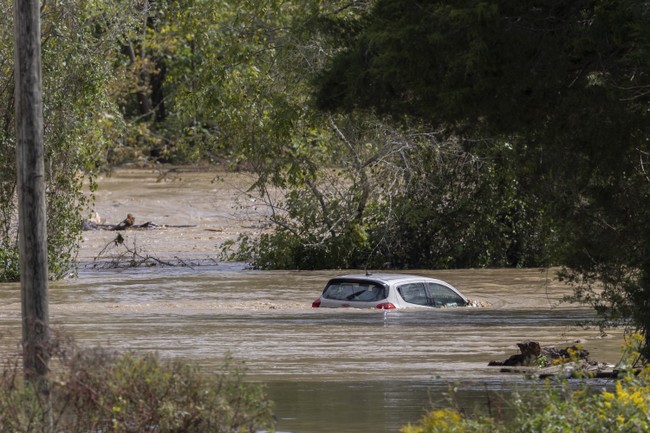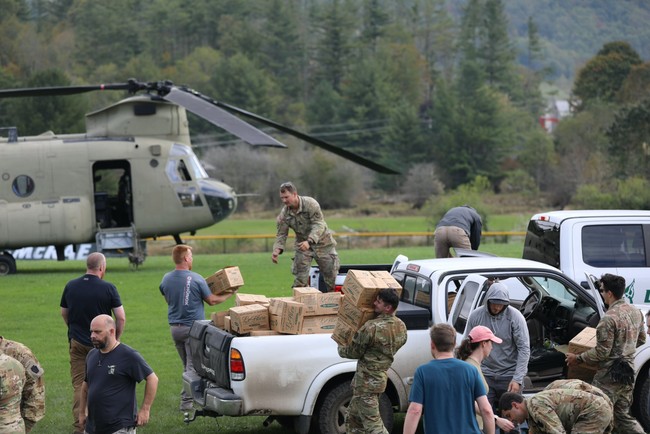A former Navy Seabee and member of President Donald J. Trump’s Veterans and Military Families for Trump Coalition told RedState that while the effort continues to support Hurricane Helene survivors in western North Carolina, the real concern is the race against winter.
“We’ve got to try to figure out ways to get fuel to these people as it gets colder. They’re running these generators and their heaters and everything in their house, so we’re into the intricacies now of how a cold weather world makes for a much more dangerous situation,” said Chad Caton, who served with the Navy construction battalions and is also a retired firefighter.
The South Carolina resident said their military mindset takes over for him and the other veterans, going into western North Carolina, roughly operating in the terrain surrounding the town of Spruce Pine.
“Yeah, the Navy SeaBees, that’s what we do. We get in here, we run heavy equipment, we go into bad situations, and that’s what we plug into,” he said. “I’m wearing OD green pants, bloused up, ready to go.”
OD is military slang for olive drab, and when personnel blouse up their pants, they are tucked into their boots, so they are less likely to catch on brush or something else.
Caton: Helene survivors shocked, but resilient
The trained swift water rescue specialist said he and the other volunteers are inspired by the people of western North Carolina, who were struck by the hurricane that made landfall Sept. 26 as a Category 4 storm at Florida’s Big Bend and then tore into the Appalachian Mountains.
“When you go to Poplar, North Carolina, it’s a small town with 300 people, most of them elderly, and the chances of electricity aren’t good,” Caton said.
“They’re saying they may not have water for a year in some of these parts, so we want to make sure that they’re able to stay warm, have their houses hooked to generators,” he said.
“They have electricians up there that can get these generators that are being brought in by everybody,” he said. “We’ve got generators all over the place.”
One of the hurdles with elderly residents is they are not always able to pull the ripcord to start the generators, he said.
The solution is to switch out with push button generators, which are far more expensive, he said.

“I see resiliency, honestly. I look at these people humble as you can be, proud of their neighbors — there is some shock there — you could see some shock in their eyes — but a lot of people are: ‘There’s so much to be done by looking at the winter. It’s gotten cold up here,’” he said.
“I’ve been around the world in some other bad situations, and I’ve never seen more resilient people that are there for each other,” Caton said.
“We’ve met so many amazing people that we’ll want to give them a case of water, and they’re like: ‘No, no, no, I only need three or four for my medication. I don’t want to take it from somebody else,’” he said.
He said it is not easy for anyone, but they are not quitting.
“They’re all very resilient, and I mean, people are dirty, there’s no water — we haven’t showered in four days,” he said. “They’re going to bring it back. They’re not trying to go nowhere.”
Caton said he went boots-on-the-ground Wednesday as a volunteer with Heal-Corp, a St. Augustine, Florida-based non-profit comprised of disaster medicine doctors, trauma surgeons, and former military field medics.
“I was contacted by a friend of mine, Boone Cutler, who is with HealCorpsheal.org,” he said.
UPDATE-FROM BOONE IN
SPRUCE PINE, NC #HurricaneHelenehttps://t.co/KLqsKYMvQJ pic.twitter.com/05ifIaRglJ— Boone Cutler 🦅 🇺🇸 🦬 (@boonecutler) October 12, 2024
“We were coming up here to assess situations and see how we could bring assets in, be it a medical tent and doctors or supply the outlying areas with mules,” he said.
Caton said mules have been critical because of the challenging topography, such as the case of Poplar.
“You can’t get to Poplar, North Carolina, from North Carolina. They have to use a helicopter or come in from Tennessee,” he said.
“The mules can be packed up with water and medical supplies,” he said. “Then we bring the pack mules into these places that can’t be reached and get the people that could be up there for four or five days more depending on their helo drops and not have their medicine or not have food or water.”
The mules are also from out of state, he said. “We have seven mules coming out from West Texas because, in some places, the roads were taken out,” adding, “These two cowboys from West Texas drove ’em up here in their trailer.”
Caton said the storm, with its significant flooding, has changed the map in western North Carolina.
At one point, he was asking about a river, but it had no name, he said.
“They said: ‘We don’t really know because it wasn’t ever a river, now it is,’ so I don’t know if that meant that was a creek or I don’t, that’s the problem,” he said.
“It might have been a 20-foot across creek or river, and now you can see it was like 180 feet across and 100 feet deep, so now the footprint of this water is ridiculous. It’s unfathomable,” he said.

Caton: Strong Army presence, weak FEMA presence
“I have not seen FEMA in the field at all, and that’s all I can speak to,” he said.
“We saw their trailers and used their bathrooms once in Asheville,” he noted.
“Their trailer’s sitting in a parking lot somewhere, and they’re all just sitting out there drinking coffee,” he said. “I don’t really know what FEMA’s doing, to be honest with you.”
Caton said he has not seen FEMA personnel in the field in his four days on the ground in the affected areas.
“I haven’t seen a FEMA truck. I haven’t seen a FEMA person. I haven’t seen FEMA anywhere at any of these volunteers or these volunteer firehouses and the subsequent churches,” he said.
“FEMA is nowhere to be seen. We’ve heard stories about FEMA, but I haven’t seen them other than in Asheville sitting in a parking lot in some big million-dollar trailer,” he said.
Caton said he could not distinguish between the Army National Guard, 82nd Division, 101st Division, and other units under the direction of Army North, so he is just calling it all the U.S. Army.

He said many of the Army personnel and equipment are operating out of a Harley Davidson dealership in Asheville, a site they are calling Camp Savage.
“We’ve seen them, and we’ve seen the engineers get out here. We saw them pull out a truck that was in the middle of the river,” he said.
“I’ve seen a lot of them in areas,” he said.
“The Blackhawks are flying out of Savage there. We’ve seen Chinooks out in the field. We’ve seen the Chinooks that landed and brought in generators and whatnot,” he said.
“We just saw them; they have the mountain Jeeps where you can put eight guys on it, and then we’ve seen the Hummers and we’ve seen their heavy equipment with their mob trucks and down at one place.”
If you were affected by hurricanes Helene and Milton or another natural disaster, you can find federal programs to support your recovery at FEMA.gov.
